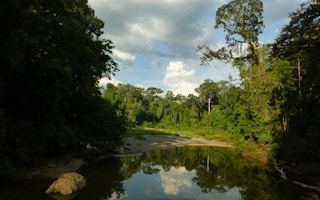A “use and dispose” mentality permeates every facet of modern life. It pays no attention to real costs and the fact that it leads to over-consumption, extracts a heavy toll on the environment’s finite resources, and creates mountains of waste.
Ironically, the new environmental consciousness has painted “slash and burn” - the traditional agricultural practice of many indigenous communities - as extremely harmful to the environment without understanding how, in albeit limited ways and accompanied by many other facets, this is a way to regenerate the land.
Against this backdrop the question is whether moving the Indonesian capital from Jakarta to a purpose-built new city in East Kalimantan on the island of Borneo is a new form of “urban slash and burn”, with all its connotations.
The proposal needs legal, environmental and moral interrogation - not only to protect indigenous peoples and the forests, but also because Jakarta’s current status of an overcrowded, polluted capital coming apart at the seams, is echoed in every one of Asia’s fast-developing economies.
If countries abandon their unregulated urban messes to go after virgin land to build new megacities, the environmental pressure will increase exponentially. The impact will be felt first by those who live in the forests, but through further contraction of forests, the accompanying devastation of global biodiversity will be felt by everyone.
Borneo is one of the last major environmental sanctuaries in a part of the world where the race for development has consumed disproportionate amounts of its natural wealth. Asian development shows ample evidence of what climate activist Greta Thunberg recently labelled as our “war against nature”.
The contrast between the protection of the environment in the Indonesian Kalimantan region, and the situation in the neighbouring Malaysian states of Sabah and Sarawak which also share Borneo, is stark.
While Sabah and Sarawak have become increasingly urbanised, Kalimantan remains home to a wide variety of flora and fauna, with pristine forests and beaches. This has not happened by chance. The indigenous Dayak population have made environmental custodianship arguments for decades, and sought means to resist aggressive development, even persuading Indonesian authorities to back their cause.
Indonesia’s landmark judgement in 2013 recognised indigenous rights to territory, articulated their custodianship of the forest, and sought to enshrine these in law. But the judgement remains unimplemented, with the Recognition and Protection of the Rights of Indigenous Peoples bill stalled in Parliament.
“
The relocation of the country’s capital to this region needs to prioritise consultation with indigenous communities.
Despite the pressure of urbanisation and industrialisation, the indigenous community in conjunction with the tacit, and in better times explicit support of the authorities, managed to safeguard the region, inspiring hope in Indonesia’s leadership in Asian environmental protection. The unspoilt nature of the region is a direct consequence of the guardianship of the forests.
The relocation of the country’s capital to this region needs to prioritise consultation with indigenous communities.
The norm of free prior informed consent is increasingly accepted as a strong principle of customary international law, and the consent sought must be on the basis of full disclosure and impact assessments.
The scale and magnitude of this move highlights the necessity of wider consultation with Indonesian and international environmentalists, who could model the full impact of the move, while also providing data from a non-anthropocentric perspective.
If the necessity for the move is established, it would be equally important to review plans to mitigate the environmental disaster around Jakarta, in seeking its revitalisation and recovery.
At a global level it is imperative that we combat the “use and dispose” mentality that fuelled the most recent spurt in the wealth of nations. This cycle is unsustainable, and evidence shows that the profits generated by the mega production-consumption drive have accumulated wealth in the hands of a few, and not generated as many jobs as promised.
Allowing an extension of this mentality to land use and urbanisation will hasten the demise of environmentalism while consigning a variety of more sustainable lifestyles - human and animal - to the confines of history.
Joshua Castellino is the executive director of Minority Rights Group International and professor of law at Middlesex University.
This story was published with permission from Thomson Reuters Foundation, the charitable arm of Thomson Reuters, that covers humanitarian news, climate change, resilience, women’s rights, trafficking and property rights. Visit http://news.trust.org/climate.









